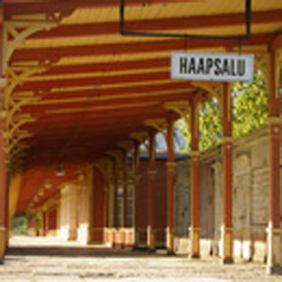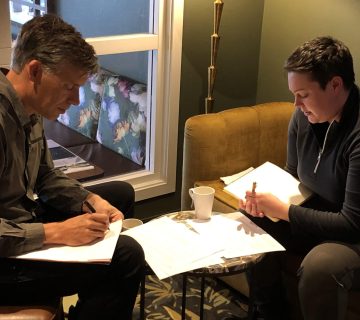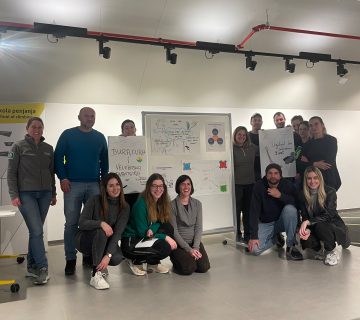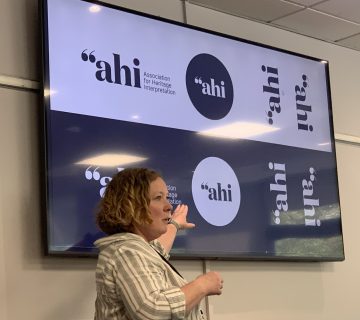‘Fostering heritage communities’ is the title of our next Interpret Europe Conference from 8-11 May 2020 in Haapsalu, Estonia.
|
Heritage interpretation supports visitors of heritage sites as well as local people in their search for meaning in heritage. |
While many parks, monuments and museums might agree that a lively heritage community is invaluable for their site, they often feel challenged by debates with local people and by engaging with volunteers in interpretation, who all bring their own issues and opinions to the site.
Our conference intends to bridge that gap between abstract concepts, such as participation and citizenship building, and the very practical need to ‘get things done’. It seeks to explain the ideas behind contemporary approaches to heritage interpretation and to exchange experiences of practitioners about how to bring the theory to earth.
Considering the political background, the conference especially intends to bring two European conventions to life: the Faro Convention and the Florence Convention.
|
Heritage communities ‘A heritage community consists of people who value specific aspects of cultural heritage which they wish, within the framework of public action, to sustain and transmit to future generations’ (Faro Convention, Article 2b). |
Heritage communities are a cornerstone of the Council of Europe’s Framework Convention on the Value of Cultural Heritage for Society (Faro Convention). The preamble of this outstanding Convention highlights ‘the need to put people and human values at the centre of an enlarged and cross-disciplinary concept of cultural heritage’ and ‘to involve everyone in society in the ongoing process of defining and managing cultural heritage’. The Convention asks us to ‘encourage everyone to participate in the process of [â¦] interpretation’ (Article 12a) and to enhance ‘respect for diversity of interpretations’ (Article 7a). In the Faro Convention’s wider understanding, cultural heritage ‘includes all aspects of the environment resulting from the interaction between people and places through time’ (Article 2).
|
Landscape ”Landscape’ means an area, as perceived by people, whose character is the result of the action and interaction of natural and/or human factors’ (Florence Convention, Article 1a). |
In terms of open landscapes, the Council of Europe’s European Landscape Convention (Florence Convention) mirrors many of the aspects mentioned in the Faro Convention. It defines a landscape as a ‘basic component of the European natural and cultural heritage, contributing to human well-being and consolidation of the European identity’ (Preamble). It expresses the need to ‘increase awareness among the civil society, private organisations, and public authorities of the value of landscapes’ (Article 6A) and it claims ‘participation of the general public, local and regional authorities, and other parties with an interest in the definition and implementation of the landscape policies’ (Article 5c).
Questions
What does all of this mean for heritage interpretation? In relation to the conference title, ‘Fostering heritage communities’, we invite proposals for presentations and interactive workshops that particularly address one or more of the following questions:
- What turns the living experience of heritage into a process fostering active citizenship?
- How can we involve favourable as well as critical stakeholders with heritage communities?
- How can we encourage people to reflect upon heritage sites from different perspectives?
- How can co-creation of interpretation help people to understand heritage?
- What role do acknowledged experts play if other stakeholders start to interpret heritage?
- Can anybody be an interpreter?
- What triggers engagement and boosts a sense of fulfillment for volunteer interpreters?
- Considering a shift of paradigms, what new qualities does interpretive training need to have?
- Are values of heritage defined by communities, or do communities enhance the value of heritage?
- How do the Conventions’ concepts of heritage and heritage communities compare to current theories of heritage interpretation, and what conclusions can we draw from that?
Apart from dealing with these questions, we also welcome presentations and workshops that focus on the theory and practice of heritage interpretation as a discipline. Besides theoretical essays, descriptions of remarkable case studies or good practice also fulfil the requirements.
Format
Interpret Europe conferences attract up to 200 attendees from as many as 40 countries. Besides four keynote addresses in the plenary, 60-80 workshops and presentations are run in parallel, in different strands. The call refers to these parallel sessions.
Presentations can be 25 or 55 minutes long including ten minutes for exchange of views. We generally recommend keeping presentations as short and as inspiring as possible. Workshops can be 55 or 85 minutes long and need to be differentiated by ensuring the active involvement of the participants.
Selection
A dedicated Review Team will consider all paper abstracts and decide whether they are a sufficient basis for a workshop or presentation.
Submissions
Please submit an abstract of your presentation or interactive workshop by 1 February 2020 using the template on www.interpreteuropeconference.net/call-for-papers. You will find all information about requirements for this abstract there.
Proceedings
Conference proceedings will be published on the IE website from the day that the conference begins. They will have their own ISBN and include all full papers received by 15 April 2020.
Delivering a full paper is not mandatory for giving a presentation or workshop. Either can also be based on the paper abstract. Paper abstracts are published as part of the proceedings.
Contact
Our IE Conference ‘Fostering heritage communities’ will be organised by our institutional member SALM, the Foundation of Haapsalu and Läänemaa Museums.
If you have any questions, please contact Conference Manager, Karin Mägi from SALM: karin.magi@interpreteuropeconference.net.
|
Haapsalu The charming Baltic Sea resort of Haapsalu provides the setting for our conference. The stunning seashore, its islands and the nearby Matsalu National Park are among Europe’s best places for birdwatching and there will be plenty of opportunities to do so. Haapsalu’s historic railway station was directly linked to Saint Petersburg; it was built to allow the Russian tsars to arrive directly by train to take the waters and enjoy rejuvenating mud baths. The little town was a haven for renowned writers, artists and poets and still retains an elegant, aristocratic air with colourful wooden houses, its romantic episcopal castle and St Nicholas Cathedral. |
Study visits
Exploring the closer and further surroundings in groups is an essential part of all Interpret Europe conferences. Study visits offer a balance of activity with indoor sessions and allow for exchanges about interpretive practice.
Among our destinations for study visits will be Tallinn, the capital of Estonia. Once a trading hub of the Hanseatic League in the 14th to 17th centuries it is one of the best-preserved medieval cities in Europe and a UNESCO World Heritage Site. Its Great Guild Hall was awarded the European Heritage Label. During the conference, we will also experience fascinating natural history sites along the sea coast or on one of the islands close to Haapsalu and we will go on tour for bird watching on the moorland. We will discover museum gems in the Haapsalu and Läänemaa region as well as the Estonian Open-Air Museum, showcasing and interpreting 74 buildings from all regions in Estonia.
Hospitable and passionate Estonian people dedicated to their heritage are looking forward to sharing their stories and experience with you.
Important dates
1 January: Registration opens
1 February: Deadline to submit abstracts of papers
15 February: Authors received feedback about their paper abstracts
15 March: Abstracts of papers will be online
15 March: Deadline for authors to have registered and paid the conference fee
15 April: Deadline to submit full papers (full papers are not mandatory)
8 May: Full papers and paper abstracts published in online proceedings




